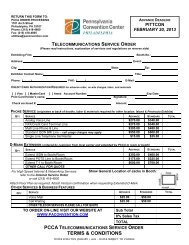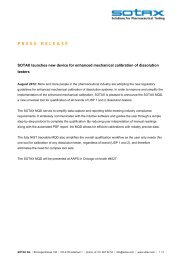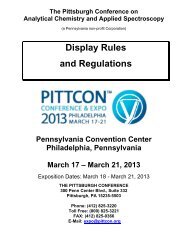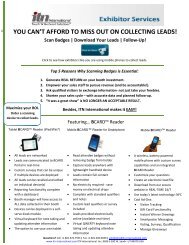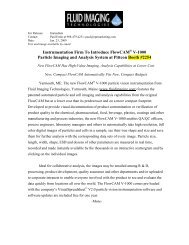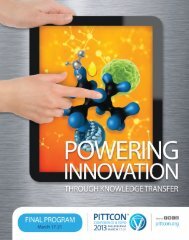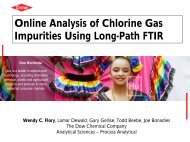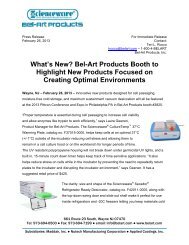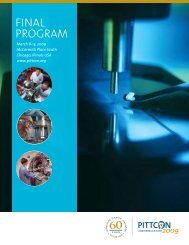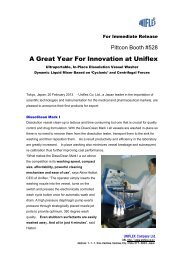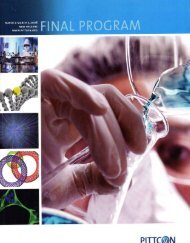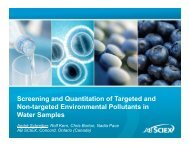2012 Final Program - Pittcon
2012 Final Program - Pittcon
2012 Final Program - Pittcon
Create successful ePaper yourself
Turn your PDF publications into a flip-book with our unique Google optimized e-Paper software.
PITTCON <strong>2012</strong> EXHIBITOR SEMINAR LISTING<br />
EXHIBITOR NAME ROOM # DESCRIPTION<br />
1:45 p.m. – 2:45 p.m.<br />
Empower 2/3 Live Tutorial: Using Custom Fields to Streamline Your Empower Workflow<br />
The use of custom fields can improve laboratory efficiency as you perform calculations automatically through Empower. This live tutorial session will help<br />
you access the flexibility built into Empower and give you the confidence to customize your use of Empower to meet your lab application needs.<br />
You will learn how to:<br />
• Customize data entry by adding your own sample identifiers such as batch number<br />
• Create custom calculations with peaks, such as summing peak areas in a chromatogram within limits that you define ( a Boolean calculation)<br />
• Perform an inter-sample calculation, such as averaging component amounts from multiple injections on different lines of a sample set<br />
3:00 p.m. – 3:45 p.m.<br />
Understanding the Proposed Changes to USP General Chapter Chromatography <br />
The United States Pharmacopeia (USP) General Chapter Chromatography describes the range of allowed adjustments in an HPLC system when the<br />
suitability test fails. In 2009 a Stimuli article was posted in the Pharmacopeia Forum that proposed a new approach with the aim of adding more flexibility<br />
to selecting and adjusting HPLC column dimensions while preserving the quality of the separation. In this seminar, one of the authors of this Stimuli article<br />
describes the scientific rationale behind these proposed changes along with the benefits that they could provide to method development, quality control<br />
and generic drug analysis laboratories.<br />
4:00 p.m. – 5:00 p.m.<br />
Principles of SPE: Introduction to Solid-Phase Extraction - Why and How to Best Solve Sample Preparation Problems<br />
More and more, analytical scientists are utilizing SPE technology to help solve many of the problems encountered with sample preparation. As newer, more<br />
rapid analytical techniques speed up the work flow in the lab, upfront sample preparation often becomes a bottleneck to productivity. This seminar will<br />
provide you with a strong background on the fundamentals of this chromatographic technology as well as a guide to the powerful SPE processing<br />
strategies that can be used to tackle difficult problems. An SPE demonstration is included.<br />
Tuesday, March 13, <strong>2012</strong><br />
9:30 a.m. – 10:30 a.m.<br />
Compliance - Meeting the Challenge of Increased FDA Focus on CDS Systems<br />
Ensuring the integrity of data supporting the quality or safety of regulated products can be a time-consuming laboratory challenge. In this session you will<br />
learn about:<br />
• Recent FDA guidance concerning laboratory data & its impact<br />
• The criticality of adopting electronic data review practices<br />
• Strategies to supporting the defensibility of laboratory data<br />
10:45 a.m. – 11:45 a.m.<br />
Principles of SPE: Troubleshooting Techniques to Maximize Productivity in your Lab<br />
This seminar is designed for those with some experience with SPE and SPE methods development. The discussion will specially benefit those who need to<br />
improve existing methods, or create new methods that are more robust in order to maximize laboratory productivity. Several important topic areas and<br />
tools will be presented: how to improve performance; how to minimize variations in sample % recovery results, the impact of proper sorbent wetting to<br />
reduce variability, and the identification of the root cause of poor recoveries through the use of mass balance and cartridge break-though capacity studies.<br />
You will leave with an important set of tools that will help you be more successful in your SPE efforts.<br />
12:00 p.m. – 1:00 p.m.<br />
Empower 2/3 Live Tutorial: Managing and Auditing Data Electronically with Empower<br />
In laboratories with UPLC, data is being generated faster than ever before. In this live tutorial session you will investigate data integrity by viewing<br />
changes and viewing audit trail information. It is important to view the entire electronic record of the data generated by the analyst rather than solely<br />
referring to multiple pages of printed documents.<br />
You will learn:<br />
• How to follow the path of how processed data is generated from raw data<br />
• If and when the data was altered<br />
• What was specifically changed and why<br />
1:15 p.m. – 2:15 p.m.<br />
Improving UPLC® Performance for the Routine Analysis of Drug <strong>Final</strong> Formulations<br />
An application area where the sample throughput, analyte response and chromatographic resolution benefits of UPLC technology have translated into<br />
significant business productivity gains is the routine analysis of drug final formulations. In this very practical seminar we will describe how UPLC<br />
technology can best be utilized in laboratories that follow chromatographic test methods found in compendial monographs. We will provide examples of<br />
drug final formulations assays taken from the USP-NF that were successfully transferred to UPLC along with routine analysis studies where the long-term<br />
robustness of the UPLC methods was evaluated.<br />
2:30 p.m. – 3:30 p.m.<br />
Theory and Practice of Ultra Performance LC® Technology<br />
What is Ultra Performance LC? Is it based on real science or is it marketing hype? Learn about the chromatographic theory and principles behind UPLC<br />
technology and discover how the predicted speed, sensitivity and resolution benefits are actually achieved. We will discuss band spreading and its effects<br />
on efficiency, van Deemter curves and peak capacity charts and how the length and particle size of an LC column can be used to predict efficiency and<br />
throughput gains by seeing how these variables (and others) affect resolution as described in the fundamental resolution equation.<br />
110




